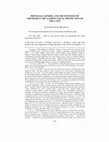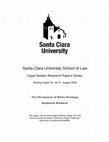Papers by Stephanie Wildman
Throughout this Article, I refer to "people of color, women, gays, and lesbians" as people who fa... more Throughout this Article, I refer to "people of color, women, gays, and lesbians" as people who face discrimination. The phrasing suggests that people of color are male, that women are white, and that gays and lesbians have no race. However, these terms are not mutually exclusive. For example, a person of color might be a heterosexual woman, a lesbian, a heterosexual man, or a gay man.
The question of the silence of women in the law school classroom is an issue ripe for legal educa... more The question of the silence of women in the law school classroom is an issue ripe for legal educators to address. The relative silence of women in law school classrooms' has always concerned me, in part because I was one of those silent women, but primarily because women's silence is a larger cultural phenomenon. 2 Society often does not see those who are voiceless. Not all of our quiet students will end their silence by becoming law professors, for whom it is not possible to remain invisible behind a wall of silence. We professors have a responsibility to pay attention to who is silent and who is not in our classrooms, to consider why some students are silent,
Texas journal of women and the law
The workplace presents an example of how supposed neutrality in language, the very words we use t... more The workplace presents an example of how supposed neutrality in language, the very words we use to describe work and the location in which it occurs, masks systems of privilege. The invisibility of the operation of privilege in the workplace perpetuates the systemic nature of disadvantage. With Title VII of the 1964 Civil Rights Act, federal law aimed at ending workplace segregation by focusing on discrimination in employment. Antidiscrimination doctrine developed under this statute has ignored privilege, ensuring the replication of systems of subordination. The resulting denial of access to jobs and to promotions serves to maintain existing economic disparity that income would alleviate and serves to perpetuate systems of privilege. 0 1995 by Stephanie M. Wildman.
The racial transformation of society envisioned in Martin Luther King's dream has been an emo... more The racial transformation of society envisioned in Martin Luther King's dream has been an emotional and powerful ideal. That vision has gone through its own transformation: it was first described as "integration," then "affirmative action," and then "diversity" and "multiculturalism." As each of these phrases acquired negative connotation from reactionary, conservative backlashes, a new phrase has had to be invented to carry forward that transformative vision. Yet the cycle of exclusion that gives privileges to the dominant cultural status quo continues.

The United States Supreme Court's failure to understand the relationship between individuals ... more The United States Supreme Court's failure to understand the relationship between individuals and groups in its equal protection jurisprudence has resulted in jurisprudence that makes no sense. The Court's inability to recognize the forms of bias associated with group membership has hampered the realization of the equal protection ideal. Analyzing the Court's gender equality decisions, the author proposes another path in equal protection jurisprudence that would analyze systemic privilege, recognizing the structures of subordination and domination. Examining equal protection through a privilege lens would clarify the interrelation of individuals to groups, provide an avenue for addressing biases, and sidestep the intent requirement currently mandated in cases alleging discrimination. A privilege analysis would ensure that the vision of democratic participation, central to the meaning of the Equal Protection Clause, could become a reality.

Most discussions of white privilege emphasize the individual benefit to the holder of privilege. ... more Most discussions of white privilege emphasize the individual benefit to the holder of privilege. Yet dynamics beyond the individual combine to reinforce and reinvent white privilege. Socio-cultural factors operate in conjunction with material forces, enabling whites to self-perpetuate as a dominant racialized identity. Material forces such as the distribution of societal goods and resources, the division of labor, and immigration policies, create a world that privileges whiteness. Socio-cultural factors, including discursive practices, patterns of behavior, and the thinking patterns that language creates, further strengthen white privilege, contributing to its endurance. This article focuses on four socio-cultural factors that reinforce white privilege: (1) the contemporary cultural push to colorblindness; (2) the sleight of mind that typifies the relation between an individual and groups in American culture; (3) a comfort zone in whiteness, which includes whiteness as the fabric of...

SSRN Electronic Journal, 2000
ABSTRACT In her review essay Interracial Intimacy and the Potential for Social Change, Stephanie ... more ABSTRACT In her review essay Interracial Intimacy and the Potential for Social Change, Stephanie Wildman examines Interracial Intimacy: The Regulation of Race and Romance by Rachel F. Moran. Moran's book investigates the so-called private landscape of race in the context of interracial intimacy. Moran urges the connection between our personal, private views of race and racial issues and the policy decisions society makes in the public realm. Moran explores historic antimiscegenation laws and their role in establishing societal norms and customs, the significance of race in daily life, the legal decisions leading to Loving v. Virginia, and the role of race in custody and adoption decisions. Wildman observes that interracial gay and lesbian relationships represent another area usually viewed as private, yet which implicates the societal landscape. Recognition of the public aspect of personal choice is a necessary element in the fight against bias and the movement toward social change.




Uploads
Papers by Stephanie Wildman